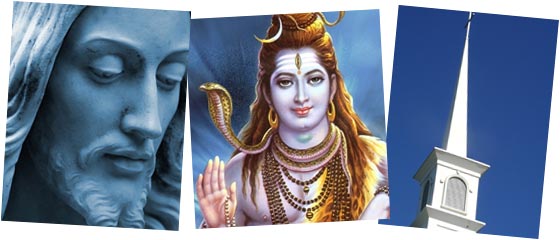 ![[Header]](../XuShared2/Line3.jpeg)

Add a Comment (Go Up to OJB's Blog Page) Its a Miracle!Entry 865, on 2008-10-07 at 20:13:10 (Rating 3, Religion) This morning I listened to a podcast which discussed miracles. Miracles have always been interesting to me because of my interest in skepticism and atheism. One of the big problems with the topic (and one not fully resolved in the podcast) is to define what a miracle actually is. There are three definitions in my dictionary: a surprising and welcome event that is not explicable by natural or scientific laws and is therefore considered to be the work of a divine agency; a highly improbable or extraordinary event, development, or accomplishment that brings very welcome consequences; and an amazing product or achievement, or an outstanding example of something.
I think that clearly we should be talking about the first instance. The key phrase there is "considered to be the work of a divine agency". Of course (and rather tediously) we now have to define "divine" and this will vary depending on what religious beliefs the person has, but its clearly something associated with a god. Then we have the problem of some people defining god in a very generic way but let's not go there and just stick to the traditional idea of a god (that is an entity and not just an interpretation of natural laws of phenomena).
After that rather involved introduction I should comment on what I think miracles are and what their function is. First, I've got to say there are no real miracles. Nothing has ever happened (and been well documented and confirmed) which requires a supernatural explanation. Miracles are a religious or psychological or philosophical or political mechanism which fulfill particular purposes. So what are some of those purposes?
Well some of the more famous miracles are parts of religious mythology. Two famous ones from Judeo-Christian mythology are the parting of the Red Sea, and the Resurrection and its associated events. Again I must start by saying that there is no good evidence that either of these events ever happened.
The Red Sea parting is particularly silly. There is really no doubt that it didn't happen because there is absolutely no physical or historic evidence outside of the Bible and we would expect to find that evidence of such a major event involving such large numbers of people (on both the Jewish and Egyptian sides).
The resurrection is a bit more difficult. Again there is no evidence outside the Bible but that's not necessarily quite as significant because it was a much less major event (involving only a few people). Of course, the events associated with it, such as the Sun disappearing and the dead bodies walking around (which would surely have been noticed and documented outside the Bible) strongly suggest that it is also just a silly story with no truth.
I used the word silly twice above because treating these stories as true is foolish in my opinion, but what about the less literal meaning of the stories? Well many people will say they have deeply symbolic meaning which transcends their superficial literal truth. I say that is just a feeble excuse. In reality these miracles were invented for particular purposes. First, to make the deity seem like it was more impressive and in control and second to make the minority group who believed the stories feel like they were more important.
So if you were a Jewish tribe who wasn't having much of a good life wouldn't it be good to have a story which makes you the chosen people of a mighty god? That would make the people feel better and confer more power to the religious leaders for sure. I think this is simply why the myth exists. Its just a "feel good" story to stop people from getting too depressed about their lives.
So what about the Jesus myths? I think the early church had a lot of competition and the other gods performed all sorts of miracles which meant they also had to have some to compete. This explains why the stories change so much, why some are included in some books of the Bible and not others, and why they correspond so closely to other religious beliefs around at the time.
So again there is no deep meaning, no hidden revelation, and no spiritual truth. These stories are just convenient religious practicalities which were necessary to forward the religious and political agenda at the time they were invented. OK sure, some of them are neat stories and make good epic movies or horror stories but the only real miracle is that some people are naive enough to really believe them!
 There are no comments for this entry. 
You can leave comments about this entry using this form. To add a comment: enter a name and email (both optional), type the number shown above, enter a comment, then click Add.
Note that you can leave the name blank if you want to remain anonymous.
Enter your email address to receive notifications of replies and updates to this entry.
The comment should appear immediately because the authorisation system is currently inactive.
![[Comments]](../XuShared/Comment1B.jpeg) ![[Preview]](../XuShared/Comment6B.jpeg) ![[Blog]](../XuShared/Up2B.jpeg)
|

![[Comments]](../XuShared/Comment1B.jpeg)
![[Preview]](../XuShared/Comment6B.jpeg)
![[Blog]](../XuShared/Up2B.jpeg)